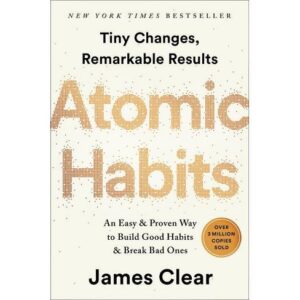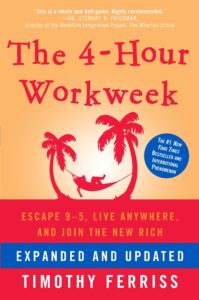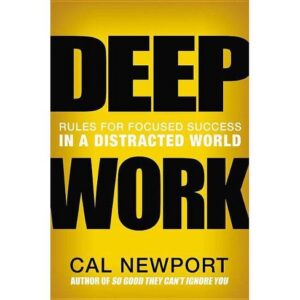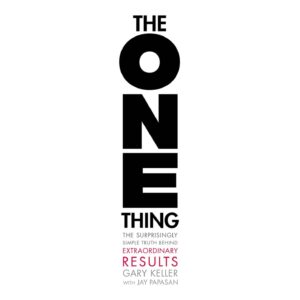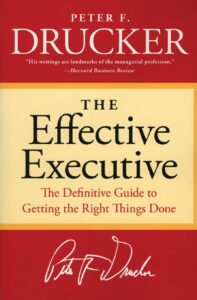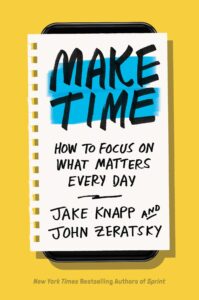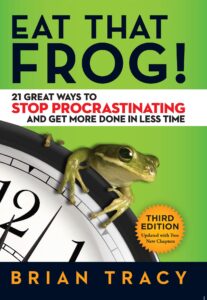Productivity, and time management books can give you advice on strategies to implement that can help you to become more efficient. When we talk about productivity and time management, everyone has a different answer. “Set a schedule,” “Don’t procrastinate,” “Discipline yourself.” While these may be true, there are many authors who have come up with brilliant solutions to our productivity and time problems and shared them with the world through books.
These time management books will teach you how to be productive and manage your time wisely. It will help you finish more work day by day and improve your work and life efficiency. Here are 7 of the best productivity and time management books to help make your work and personal life three times more efficient than before.
Atomic Habits: An Easy & Proven Way to Build Good Habits & Break Bad Ones by James Clear
Of course, the first on our list is the #1 New York Times bestselling productivity book, Atomic Habits. James Clear promotes, “Tiny changes, remarkable results.” Indeed, this book will bring great change to the way you think about the art of productivity.
In this book, Clear writes about strategies to fix your bad habits and turn them into good ones. How do habits relate to productivity you ask? Bad habits are what keep us from our goals. You may not notice these tiny behaviors, but they’re one of the largest factors of unproductivity, procrastination, and inefficiency.
He emphasizes that the problem is not you, it’s your system that is keeping you from reaching your goals. As long as you change your system, you can rise to the top of your field and Atomic Habits provides strategies for that.
This book will change the way you think about productivity and efficiency. It will motivate you to do more and help you get things done. Truly, a proven way to create good habits and reap success.
The 4-Hour Workweek by Tim Ferriss
The 4-Hour Workweek is about how Tim Ferriss thought out a dream lifestyle and turned it into reality. In the book, he explains that he used to be frustrated with the 14-hour workdays at the company he used to work at. He wanted to escape this reality. So he traveled around some parts of the world and realized that he didn’t need to work 14 hours a day to be productive.
What Ferriss did was cut down his working hours by 10 a day. Hence, the 4-Hour Workweek. Except, he is not working 14 hours every day, he is working only 4 hours each week. An incredible feat, don’t you think?
In this book, Ferriss introduces the principle of 80/20. He explains how to get your priorities straight and bring in productivity, even in just 4 hours a week. This book is about Ferriss’ experience while trying to apply his dream lifestyle and… it worked. He set up a business, hired assistants to do small tasks, and escaped the 9-5.
This man wanted to live his life to the fullest while still remaining productive and he did just that. This teaches that you don’t have to wait until you’re retired to enjoy your life. In fact, it teaches that as long as you get your priorities straight, you can be productive and enjoy your life, just as Ferriss did. The 4-hour Workweek goes way beyond time management and it is also among the best passive income books.
Deep Work by Cal Newport
With the rise of social media, many of us have been buried so far beneath the pressure of keeping up with the trends that we forget our purpose and lose focus. Deep Work revolves mainly around this growing dilemma and provides a solution for every distraction.
We all know that feeling when we want to focus on the task at hand but can’t seem to do so because of a few distractions that we may or may not know of. Newport writes of a few distractions in this world and one of them is social media. Because we are pressured to keep up or sometimes we just tend to scroll away, we become distracted. Therefore decreasing our productivity.
Another distraction is the pressure from deadlines. The amount of work you’ve still yet to do and the overwhelming feeling that comes with it. Sometimes, we tend to procrastinate when we are overwhelmed, but Newport’s point is to refocus and get that work done. How? By eliminating distractions and engaging in deep work.
In this book, Newport points out the distractions in our lives today, the solutions to them, and a few surprising suggestions. Like how boredom is supposedly something we should practice. Following his advice will help you with your productivity, time management and will most definitely help you be efficient in your work.
The ONE Thing by Gary W. Keller and Jay Papasan
As the title of this time management book suggests, the authors of this book wrote about focusing on only ONE thing at a time. In this book, they completely cancel the thought of multi-tasking.
In this book, they apply the principle of 80/20. This means that 20% of your efforts become 80% of your gains. They relate the 80/20 principle with their own principle, which begins with the question, “Which task should I do first so that when I finish it, every other task would be much easier?”
Now when we do this task, it is the only one we focus on. We do not engage in any other task except that ONE thing. Are you starting to get the big picture now? Their advice is to look at the big picture, then focus on small goals. This means to establish your ONE thing, which is your main goal. However, to make every other task easier, you need to make a small goal, which is your ONE thing right now.
This time management book explains that dealing with too many tasks at the same time will make you confused, overwhelmed, and unmotivated. The authors suggest that if you are overwhelmed, it will lead to procrastination, which is our #1 enemy.
By accomplishing that ONE thing, we are making ourselves more productive. Because through this, we are simplifying every other task that we must accomplish to reach our main goal. Therefore, we are managing our time and efficiency rather than if you multi-tasked and became unable to finish everything, which is most likely to happen.
The Effective Executive by Peter F. Drucker
Do you know what makes an effective executive? One might judge it by the amount of work he has accomplished or his intelligence and skills. Wrong! An effective executive knows what to do with his skills and intelligence to turn them into effective results. Thus, creating The Effective Executive.
In this book, Drucker writes about how an effective executive has a goal and knows how to reach it. To become a successful and effective executive, Drucker explains that you should know how to manage your time. Know what to work on, and know how to take advantage of your abilities. Therefore, you need to get your priorities straight and know how to make the right decisions.
Drucker explains all of this in this time management book. As an effective executive, you should practice these principles and perfect them. To make an impact in your organization and increase efficiency. This is among the best time management books for executives and business owners.
Make Time: How to Focus on What Matters Every Day by Jake Knapp and John Zeratsky
To focus on what really matters, we need to take control of our time and eliminate distractions. If you have ever wished that there were more than 24 hours in a day, then you might want to rethink your actions.
You don’t need all 24 hours in a day to get things done and accomplish more tasks. The answer all along was to get out of our default position, which is the state of being busy and distracted.
We can be distracted by all kinds of things. It could be your calendar filled with meetings and deadlines, your appointments with clients, the paperwork that you have to do. These are distractions, but what if I told you that although you have these distractions, you can still take control and accomplish them? There is certainly a way to make time for everything.
In this time management book, Knapp and Zeratsky write about the ultimate 4-step plan to improve your time management and efficiency. A genius way to be productive, escape procrastination and be efficient at work.
Eat That Frog!: 21 Great Ways to Stop Procrastinating and Get More Done in Less Time by Brian Tracy
In this time management book, there are 21 highly effective ways presented in its simplest form to help grow your productivity and be efficient with your time. To begin with, let’s start with the reason why the title of this book is “Eat That Frog!”.
Tracy explains that there is a saying where if the first thing you do each morning is to eat a live frog, then you will have the satisfaction of knowing that it's probably the worst thing you will do all day. This is the principle where you do the hardest task first, so everything else becomes easier.
How does this principle keep you productive? Doing the hardest task first will decrease your chance of procrastinating. Because you are most likely to procrastinate when you are too overwhelmed with work. Following the advice in this book will seriously improve your efficiency and time management. It will teach you how to correctly organize and manage your day so that it is time-efficient and as productive as possible.
Bottom line
Efficiency and productivity are all a matter of discipline and time management. “Will you choose to do that task now or later?” “Would I procrastinate if I do it later?”
Here is my addition to time management. Ask yourself this question, “If I do this task later, would I have enough time to finish it? Would doing it later make my other tasks easier or will it be the opposite?” Apply the advice in these productivity and time management books, and your efficiency will certainly improve.
Image source: BX


